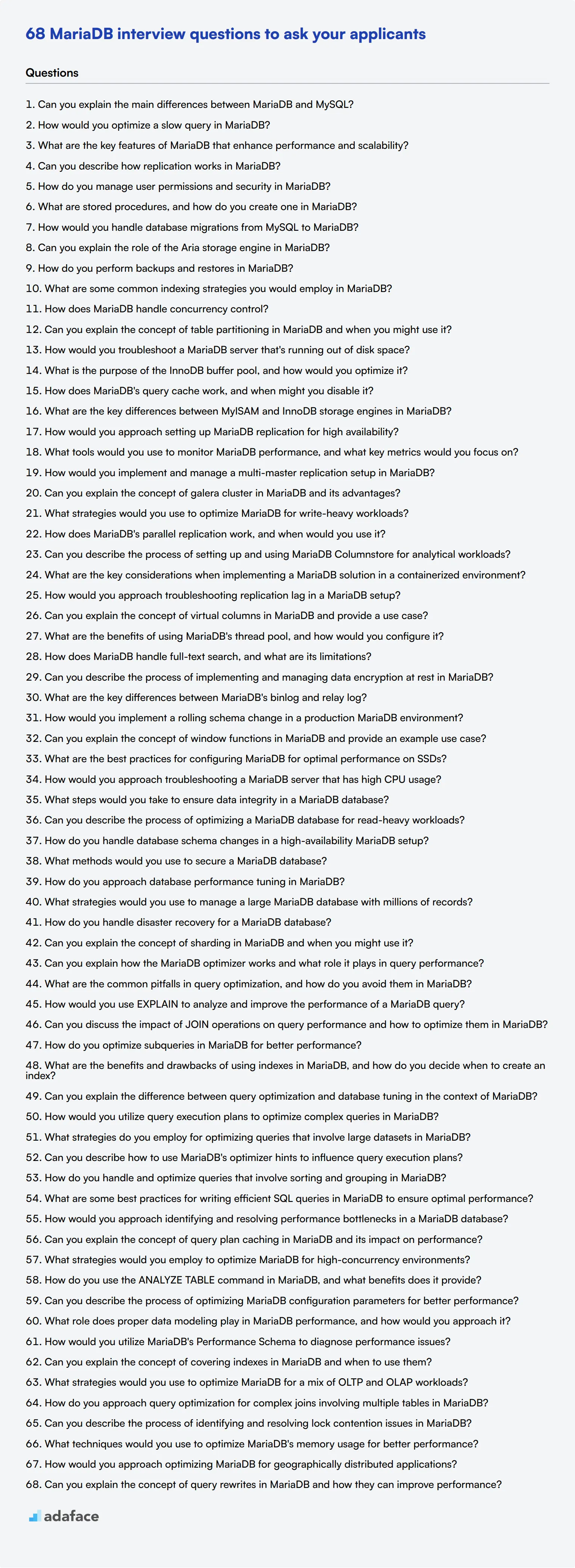Navigating MariaDB interviews can be challenging for recruiters and hiring managers seeking top-notch candidates. A structured list of targeted questions is essential to ensure you effectively evaluate the skills and expertise of your applicants, avoiding the pitfalls of bad hires.
This blog post will equip you with a comprehensive array of MariaDB interview questions tailored for different experience levels. You'll find sections dedicated to common questions, as well as specific areas like query optimization and performance tuning.
By leveraging these questions, you'll be better positioned to identify the best candidates for your team's needs. Additionally, consider using our MySQL online test as a preliminary assessment tool to streamline your recruitment process.
Table of contents
10 common Maria DB interview questions to ask your applicants
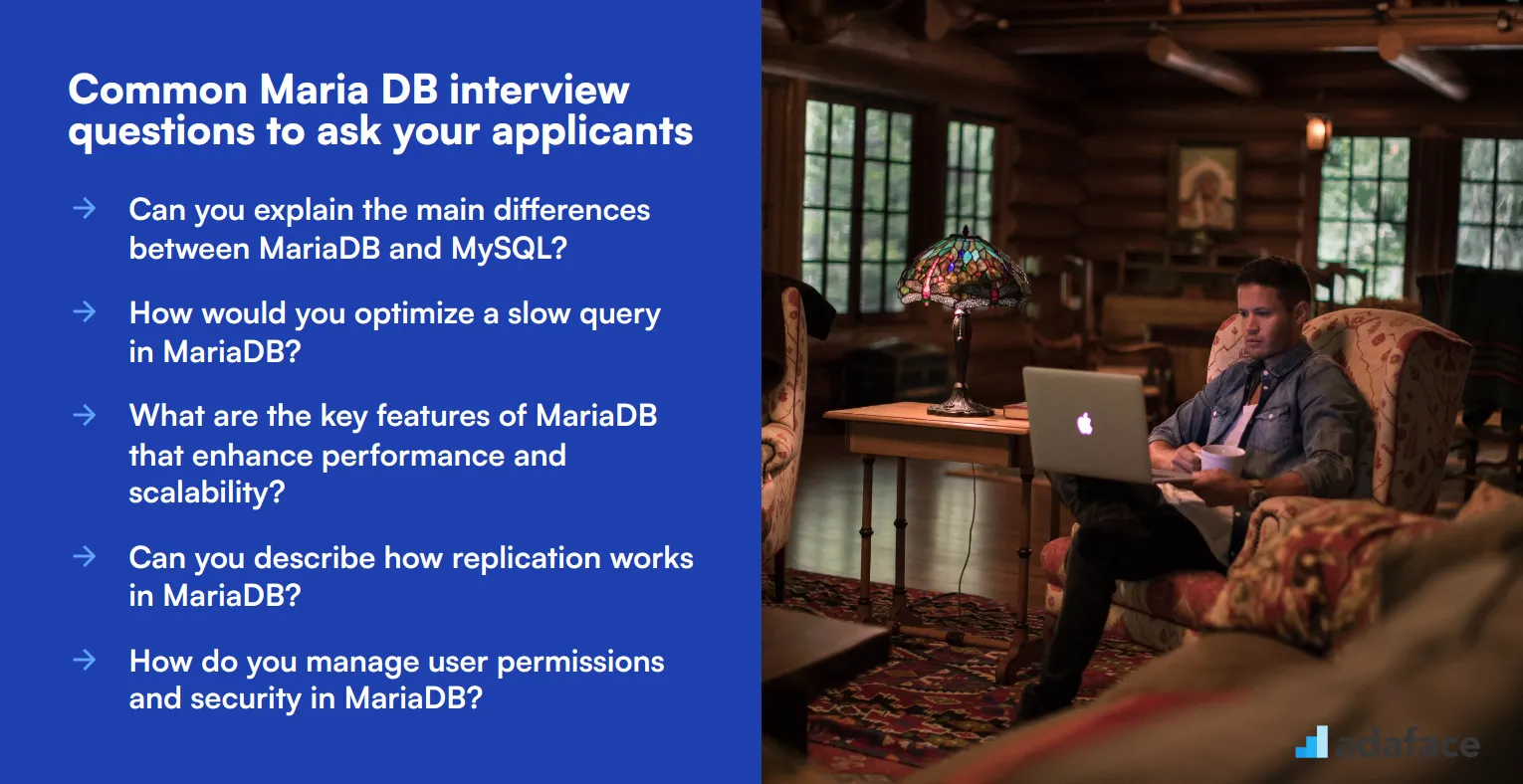
Using this list of common MariaDB interview questions can help you gauge whether your applicants have the right technical skills for the role. Tailor these questions during the interview to effectively assess their knowledge and experience in database management, especially if your company relies on database administrator tasks.
- Can you explain the main differences between MariaDB and MySQL?
- How would you optimize a slow query in MariaDB?
- What are the key features of MariaDB that enhance performance and scalability?
- Can you describe how replication works in MariaDB?
- How do you manage user permissions and security in MariaDB?
- What are stored procedures, and how do you create one in MariaDB?
- How would you handle database migrations from MySQL to MariaDB?
- Can you explain the role of the Aria storage engine in MariaDB?
- How do you perform backups and restores in MariaDB?
- What are some common indexing strategies you would employ in MariaDB?
8 Maria DB interview questions and answers to evaluate junior database administrators
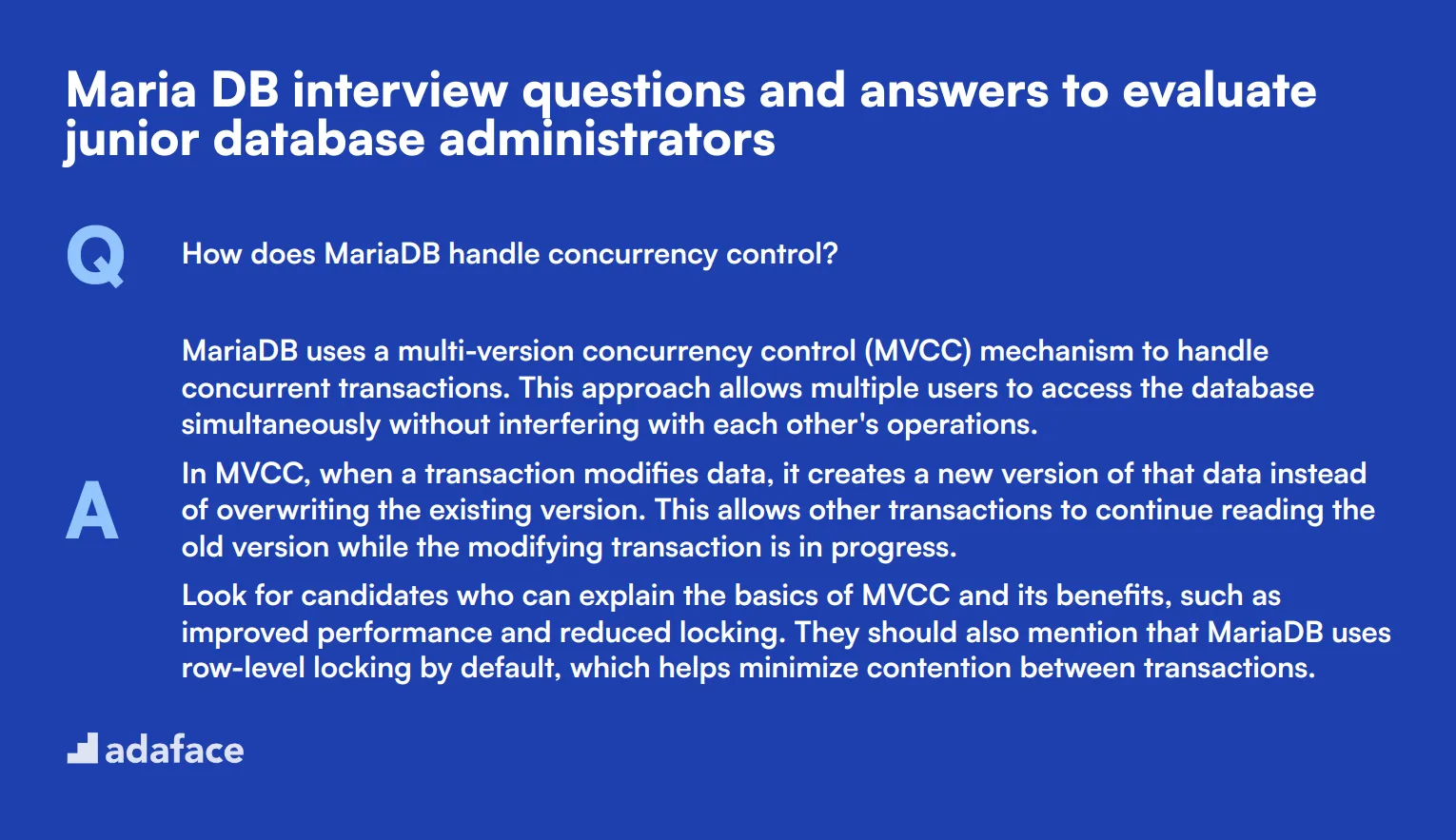
Ready to put your junior database administrator candidates through their paces? This curated list of MariaDB interview questions will help you assess their foundational knowledge and problem-solving skills. Use these questions to gauge a candidate's understanding of MariaDB's unique features and their ability to handle common database scenarios.
1. How does MariaDB handle concurrency control?
MariaDB uses a multi-version concurrency control (MVCC) mechanism to handle concurrent transactions. This approach allows multiple users to access the database simultaneously without interfering with each other's operations.
In MVCC, when a transaction modifies data, it creates a new version of that data instead of overwriting the existing version. This allows other transactions to continue reading the old version while the modifying transaction is in progress.
Look for candidates who can explain the basics of MVCC and its benefits, such as improved performance and reduced locking. They should also mention that MariaDB uses row-level locking by default, which helps minimize contention between transactions.
2. Can you explain the concept of table partitioning in MariaDB and when you might use it?
Table partitioning in MariaDB is a technique used to divide large tables into smaller, more manageable pieces called partitions. Each partition is stored as a separate table, but the table as a whole is still treated as a single logical unit.
Partitioning can be beneficial in several scenarios:
- Improving query performance by allowing the database to scan only relevant partitions
- Simplifying data archiving and deletion processes
- Distributing I/O operations across multiple disks
- Managing very large tables more efficiently
A strong candidate should be able to describe different partitioning methods (e.g., range, list, hash) and provide examples of when each might be appropriate. They should also mention potential drawbacks, such as increased complexity in database management.
3. How would you troubleshoot a MariaDB server that's running out of disk space?
When troubleshooting a MariaDB server running out of disk space, a junior DBA should follow these steps:
- Check current disk usage using system commands
- Identify large databases and tables using MariaDB queries
- Look for unnecessary data or logs that can be purged
- Check for any runaway processes or transactions
They should also consider long-term solutions such as:
- Implementing a data archiving strategy
- Setting up log rotation
- Optimizing table structures and indexes
- Planning for additional storage capacity
Evaluate the candidate's systematic approach to problem-solving and their understanding of both immediate fixes and long-term preventive measures. A good answer should balance quick solutions with sustainable database management practices.
4. What is the purpose of the InnoDB buffer pool, and how would you optimize it?
The InnoDB buffer pool is a memory area that caches table and index data as it's accessed. Its primary purpose is to improve database performance by reducing disk I/O operations.
To optimize the InnoDB buffer pool, a DBA might:
- Adjust the buffer pool size based on available server memory and workload
- Enable buffer pool instances to reduce contention on multi-core systems
- Use the buffer pool preload feature to load important data on server startup
- Monitor buffer pool hit rate and adjust accordingly
Look for candidates who understand the balance between allocating memory to the buffer pool and leaving enough for other system processes. They should also be aware of tools and queries to monitor buffer pool performance and make data-driven optimization decisions.
5. How does MariaDB's query cache work, and when might you disable it?
MariaDB's query cache stores the text of SELECT statements along with the corresponding result sets. When an identical query is executed again, MariaDB can retrieve the results from the cache instead of re-executing the query, potentially improving performance for read-heavy workloads.
However, there are scenarios where disabling the query cache might be beneficial:
- When dealing with frequently changing data
- In write-intensive environments where cache invalidation overhead becomes significant
- When using application-level caching solutions
- If the workload consists mainly of unique queries
A strong candidate should be able to explain how to monitor query cache performance using status variables and how to adjust its size or disable it entirely. They should also understand that in newer versions of MariaDB, the query cache is deprecated and disabled by default due to scalability issues.
6. What are the key differences between MyISAM and InnoDB storage engines in MariaDB?
MyISAM and InnoDB are two popular storage engines in MariaDB, each with distinct characteristics:
- Transaction support: InnoDB supports transactions, while MyISAM does not
- Locking mechanism: InnoDB uses row-level locking, MyISAM uses table-level locking
- Foreign key constraints: Supported by InnoDB, not by MyISAM
- Full-text indexing: Traditionally a MyISAM feature, but now also available in InnoDB
- Crash recovery: InnoDB offers better crash recovery capabilities
InnoDB is generally preferred for its ACID compliance and better concurrency handling. However, MyISAM might still be useful in read-heavy scenarios or for backward compatibility with older applications.
Look for candidates who can explain these differences and provide examples of when to use each engine. They should also be aware of the trend towards InnoDB as the default and preferred engine in modern MariaDB deployments.
7. How would you approach setting up MariaDB replication for high availability?
Setting up MariaDB replication for high availability typically involves the following steps:
- Configure a primary (master) server and one or more replica (slave) servers
- Enable binary logging on the primary server
- Create a replication user on the primary server
- Take a snapshot of the primary server's data
- Configure replica servers with the primary's information
- Start replication on the replica servers
Additional considerations include:
- Implementing semi-synchronous replication for stronger data consistency
- Setting up automatic failover mechanisms
- Monitoring replication lag and health
- Planning for backup and disaster recovery
A strong candidate should demonstrate understanding of both the technical setup and the broader implications for database availability and performance. They should also be aware of potential challenges like replication lag and data inconsistencies, and how to address them.
8. What tools would you use to monitor MariaDB performance, and what key metrics would you focus on?
For monitoring MariaDB performance, a junior DBA might use tools such as:
- MariaDB's built-in performance_schema
- MySQL Workbench
- Percona Monitoring and Management (PMM)
- Prometheus with Grafana for visualization
- Custom scripts using the MySQL client
Key metrics to focus on include:
- Query response time
- Connections (current, max reached)
- Buffer pool utilization
- Slow queries
- I/O operations
- Table locks
- Replication lag (if applicable)
Look for candidates who can explain why these metrics are important and how they relate to database performance. They should also demonstrate knowledge of how to set up alerts for critical thresholds and how to use these metrics to guide optimization efforts.
15 intermediate Maria DB interview questions and answers to ask mid-tier database administrators
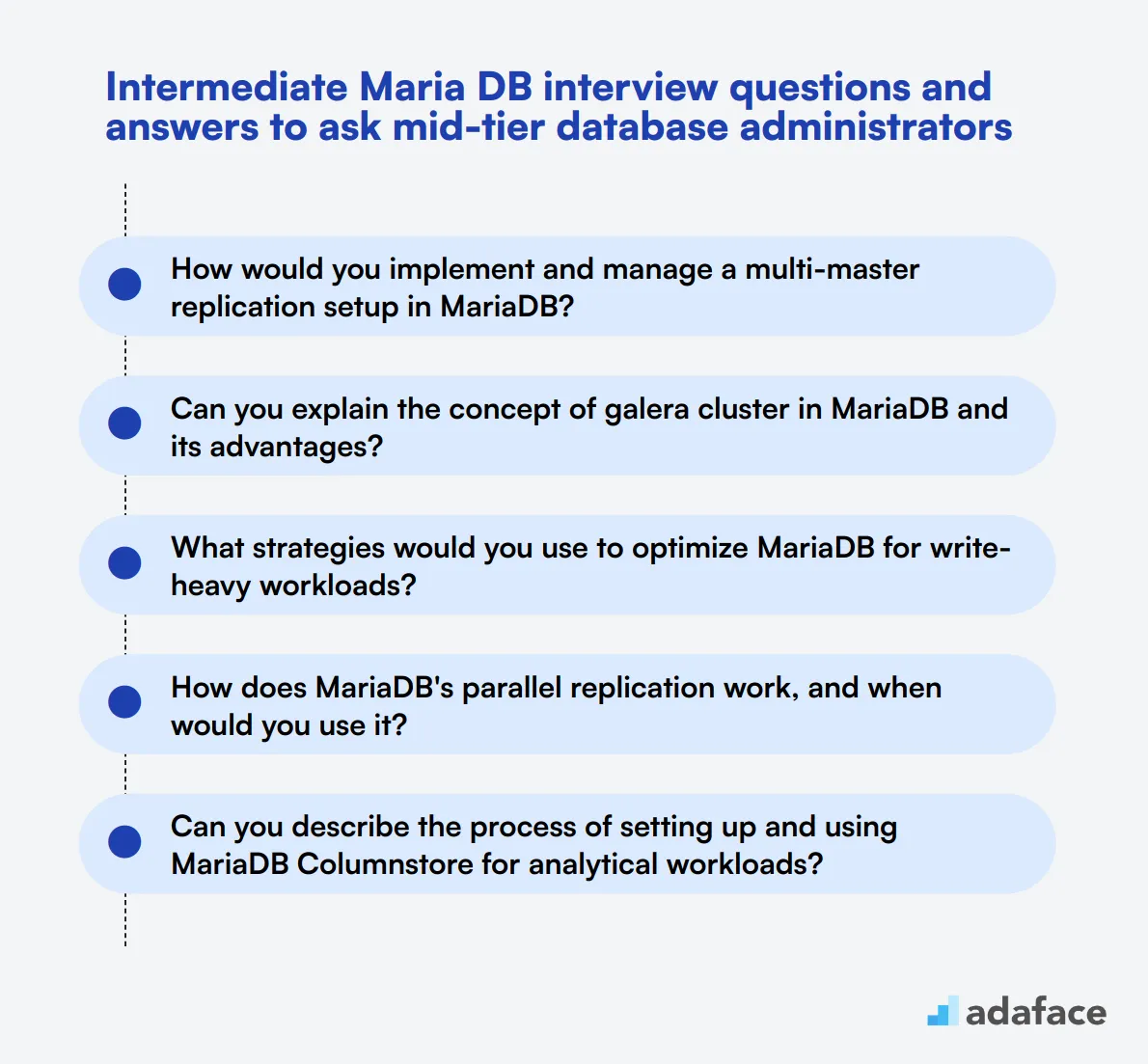
To assess the intermediate-level skills of database administrators, use these 15 MariaDB interview questions. They cover key concepts and practical scenarios, helping you evaluate a candidate's ability to handle real-world database challenges.
- How would you implement and manage a multi-master replication setup in MariaDB?
- Can you explain the concept of galera cluster in MariaDB and its advantages?
- What strategies would you use to optimize MariaDB for write-heavy workloads?
- How does MariaDB's parallel replication work, and when would you use it?
- Can you describe the process of setting up and using MariaDB Columnstore for analytical workloads?
- What are the key considerations when implementing a MariaDB solution in a containerized environment?
- How would you approach troubleshooting replication lag in a MariaDB setup?
- Can you explain the concept of virtual columns in MariaDB and provide a use case?
- What are the benefits of using MariaDB's thread pool, and how would you configure it?
- How does MariaDB handle full-text search, and what are its limitations?
- Can you describe the process of implementing and managing data encryption at rest in MariaDB?
- What are the key differences between MariaDB's binlog and relay log?
- How would you implement a rolling schema change in a production MariaDB environment?
- Can you explain the concept of window functions in MariaDB and provide an example use case?
- What are the best practices for configuring MariaDB for optimal performance on SSDs?
9 advanced Maria DB interview questions and answers to evaluate senior database administrators
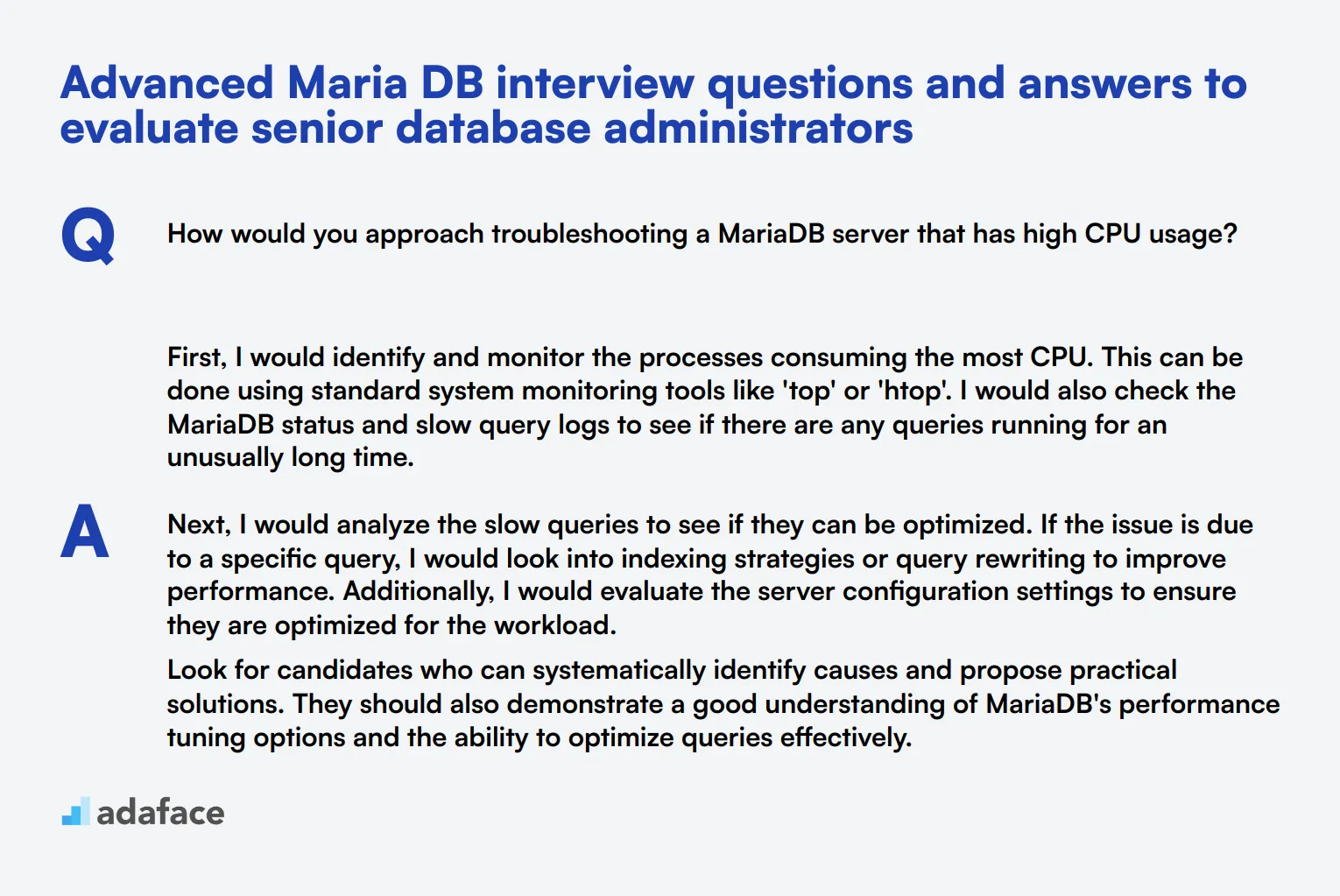
To ensure you hire the best senior database administrators, it's crucial to ask questions that gauge their advanced understanding of MariaDB. This list of advanced interview questions will help you evaluate their expertise and problem-solving capabilities in real-world scenarios.
1. How would you approach troubleshooting a MariaDB server that has high CPU usage?
First, I would identify and monitor the processes consuming the most CPU. This can be done using standard system monitoring tools like 'top' or 'htop'. I would also check the MariaDB status and slow query logs to see if there are any queries running for an unusually long time.
Next, I would analyze the slow queries to see if they can be optimized. If the issue is due to a specific query, I would look into indexing strategies or query rewriting to improve performance. Additionally, I would evaluate the server configuration settings to ensure they are optimized for the workload.
Look for candidates who can systematically identify causes and propose practical solutions. They should also demonstrate a good understanding of MariaDB's performance tuning options and the ability to optimize queries effectively.
2. What steps would you take to ensure data integrity in a MariaDB database?
Ensuring data integrity involves several measures such as using appropriate data types, constraints (e.g., NOT NULL, UNIQUE), and foreign keys to enforce relationships between tables. Regular backups and automated scripts for integrity checks can also help in maintaining data integrity.
Additionally, I would implement transaction management to ensure that all database changes are committed only if they are fully complete and consistent. Using tools like MariaDB's built-in replication can also help in maintaining data integrity across multiple servers.
An ideal candidate should highlight their experience with data integrity practices and their ability to implement robust systems for maintaining data consistency. Look for specific examples and tools they have used in previous roles.
3. Can you describe the process of optimizing a MariaDB database for read-heavy workloads?
Optimizing a MariaDB database for read-heavy workloads involves several approaches. First, I would ensure proper indexing of relevant columns to accelerate read operations. Using techniques such as indexing common search fields and composite indexes for multi-column searches can significantly enhance performance.
Additionally, utilizing query caching and optimizing the buffer pool size can help improve read speeds. Partitioning large tables can also be beneficial, as it allows the database to read smaller subsets of data more efficiently. Load balancing read queries across multiple replicas can further distribute the read load.
Candidates should demonstrate their understanding of various optimization strategies and their experience in implementing them. Look for their ability to discuss specific techniques and how they have successfully optimized databases in the past.
4. How do you handle database schema changes in a high-availability MariaDB setup?
In a high-availability setup, handling schema changes requires careful planning to minimize downtime and ensure data consistency. I would start by testing the schema changes in a staging environment to identify potential issues. Using tools like pt-online-schema-change can help apply schema changes without locking the tables.
I would also implement a rolling schema change strategy where changes are applied incrementally across replicas to ensure continuous availability. Communication and coordination with the development team are crucial to ensure that application changes are in sync with schema updates.
Look for candidates who prioritize minimizing downtime and ensuring data consistency. They should have experience with tools and strategies for applying schema changes in high-availability environments and be able to discuss specific examples.
5. What methods would you use to secure a MariaDB database?
Securing a MariaDB database involves several layers of security measures. First, I would ensure that only authorized users have access by implementing strong user authentication and role-based access controls. Encrypting data at rest and in transit is also crucial to protect sensitive information.
Regularly updating and patching the database software to address known vulnerabilities is essential. I would also configure firewall rules to restrict access to the database server and use secure connections (SSL/TLS) for communication between clients and the server.
Candidates should demonstrate a comprehensive understanding of database security practices and their experience in implementing these measures. Look for their ability to discuss specific security tools and protocols they have used to secure databases.
6. How do you approach database performance tuning in MariaDB?
Database performance tuning in MariaDB involves several steps. First, I would analyze slow queries using the slow query log and optimize them by rewriting the queries or adding appropriate indexes. Monitoring CPU, memory, and disk IO can help identify resource bottlenecks.
Next, I would adjust configuration settings such as buffer pool size, query cache size, and connection limits to optimize performance based on the workload. Regularly updating statistics and using tools like the EXPLAIN statement can also help in tuning queries effectively.
Look for candidates who demonstrate a systematic approach to performance tuning and their ability to use various tools and techniques. They should provide specific examples of how they have successfully optimized database performance in the past.
7. What strategies would you use to manage a large MariaDB database with millions of records?
Managing a large MariaDB database involves several strategies. First, I would implement partitioning to divide large tables into smaller, more manageable pieces. This can improve query performance and make maintenance tasks such as backups and archiving more efficient.
Using appropriate indexing strategies is crucial for optimizing query performance in large databases. I would also consider using a combination of in-memory and disk-based storage engines to balance performance and storage requirements.
An ideal candidate should demonstrate their experience in managing large databases and their ability to implement various strategies effectively. Look for their understanding of partitioning, indexing, and storage management techniques.
8. How do you handle disaster recovery for a MariaDB database?
Disaster recovery involves planning and implementing measures to ensure data can be recovered in case of a failure. I would start by implementing regular backups using tools like mysqldump or physical backups with XtraBackup. Storing backups offsite or in the cloud can provide additional security.
Setting up replication can help ensure data is synchronized across multiple servers, providing redundancy in case of server failure. I would also create a detailed disaster recovery plan that outlines the steps to restore data and services, and regularly test the plan to ensure its effectiveness.
Candidates should demonstrate their understanding of disaster recovery best practices and their experience in implementing these measures. Look for specific examples of how they have successfully recovered from database failures in the past.
9. Can you explain the concept of sharding in MariaDB and when you might use it?
Sharding involves splitting a large database into smaller, more manageable pieces called shards, which are distributed across multiple servers. Each shard contains a subset of the data, and together they make up the entire dataset. This approach can improve performance and scalability for very large databases.
I would consider using sharding when dealing with massive datasets that cannot be efficiently managed on a single server. By distributing the data across multiple servers, we can achieve better load balancing and reduce the risk of bottlenecks.
Look for candidates who understand the concept of sharding and its benefits. They should be able to discuss specific scenarios where sharding would be appropriate and how they would implement it in a MariaDB environment.
12 Maria DB questions related to query optimization
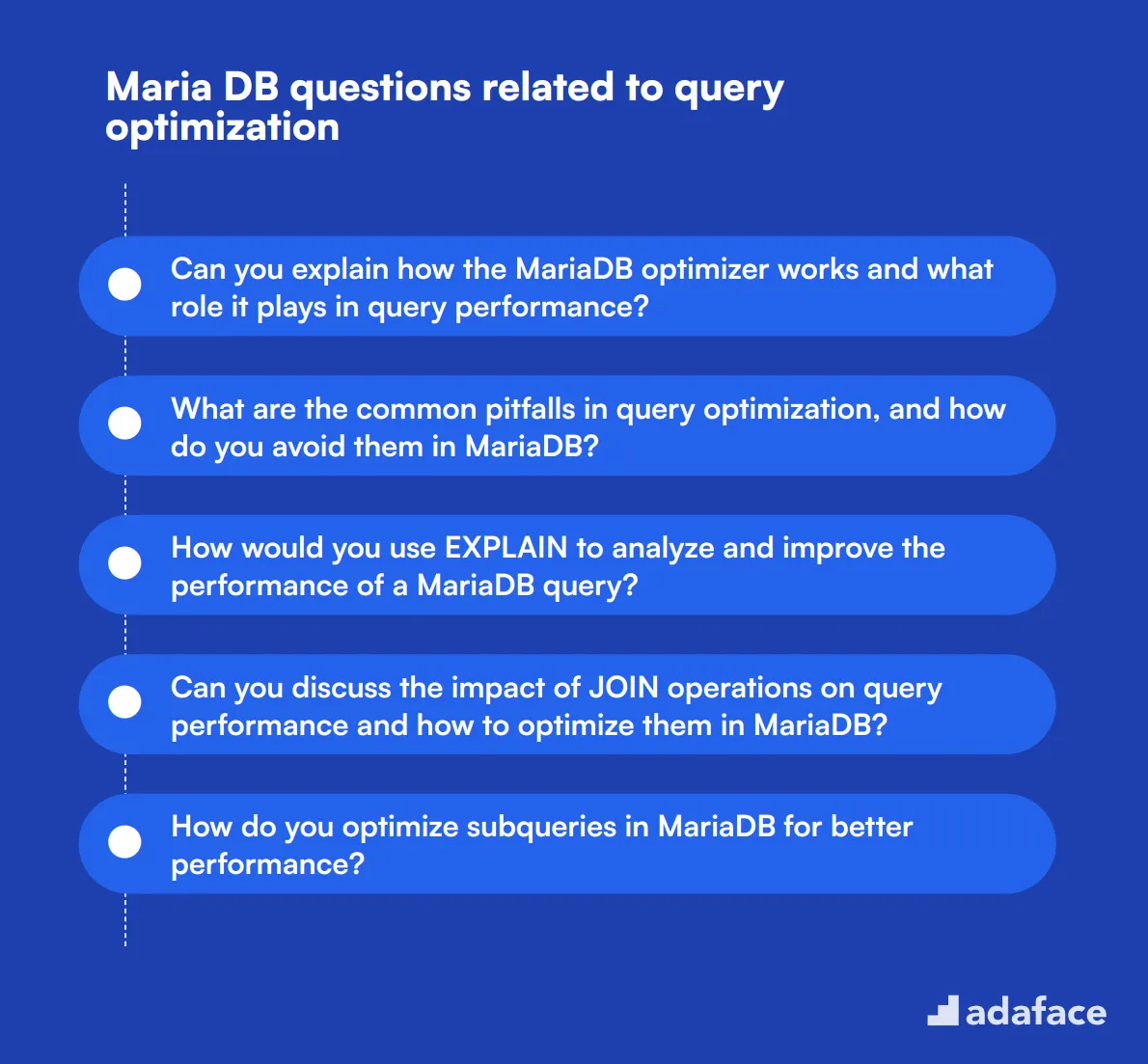
To ensure your candidates have a deep understanding of MariaDB query optimization, consider asking them some of these specific interview questions. Whether you're hiring for a database developer or a database administrator, these questions will help you gauge their expertise in optimizing queries and overall database performance.
- Can you explain how the MariaDB optimizer works and what role it plays in query performance?
- What are the common pitfalls in query optimization, and how do you avoid them in MariaDB?
- How would you use EXPLAIN to analyze and improve the performance of a MariaDB query?
- Can you discuss the impact of JOIN operations on query performance and how to optimize them in MariaDB?
- How do you optimize subqueries in MariaDB for better performance?
- What are the benefits and drawbacks of using indexes in MariaDB, and how do you decide when to create an index?
- Can you explain the difference between query optimization and database tuning in the context of MariaDB?
- How would you utilize query execution plans to optimize complex queries in MariaDB?
- What strategies do you employ for optimizing queries that involve large datasets in MariaDB?
- Can you describe how to use MariaDB's optimizer hints to influence query execution plans?
- How do you handle and optimize queries that involve sorting and grouping in MariaDB?
- What are some best practices for writing efficient SQL queries in MariaDB to ensure optimal performance?
14 Maria DB questions related to performance tuning
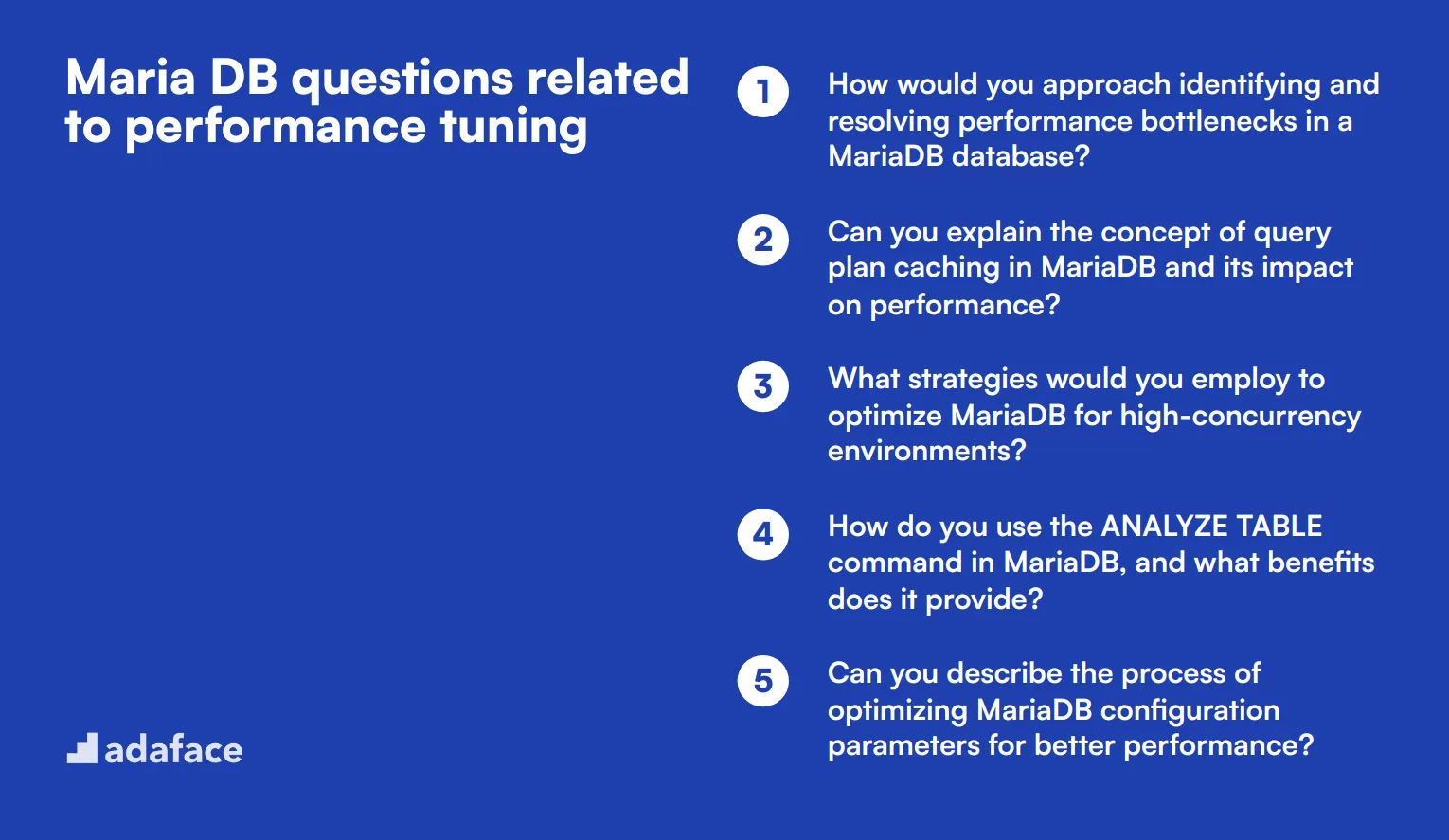
To assess a candidate's proficiency in performance tuning for MariaDB, consider using these 14 interview questions. These questions are designed to evaluate the applicant's ability to optimize database performance, handle complex queries, and implement effective tuning strategies.
- How would you approach identifying and resolving performance bottlenecks in a MariaDB database?
- Can you explain the concept of query plan caching in MariaDB and its impact on performance?
- What strategies would you employ to optimize MariaDB for high-concurrency environments?
- How do you use the ANALYZE TABLE command in MariaDB, and what benefits does it provide?
- Can you describe the process of optimizing MariaDB configuration parameters for better performance?
- What role does proper data modeling play in MariaDB performance, and how would you approach it?
- How would you utilize MariaDB's Performance Schema to diagnose performance issues?
- Can you explain the concept of covering indexes in MariaDB and when to use them?
- What strategies would you use to optimize MariaDB for a mix of OLTP and OLAP workloads?
- How do you approach query optimization for complex joins involving multiple tables in MariaDB?
- Can you describe the process of identifying and resolving lock contention issues in MariaDB?
- What techniques would you use to optimize MariaDB's memory usage for better performance?
- How would you approach optimizing MariaDB for geographically distributed applications?
- Can you explain the concept of query rewrites in MariaDB and how they can improve performance?
Which Maria DB skills should you evaluate during the interview phase?
Assessing MariaDB skills in a single interview can be challenging, as candidates may have varying levels of expertise and experience. However, there are core skills that are essential for any MariaDB professional. Evaluating these skills during the interview phase will give you a comprehensive understanding of the candidate's capabilities.
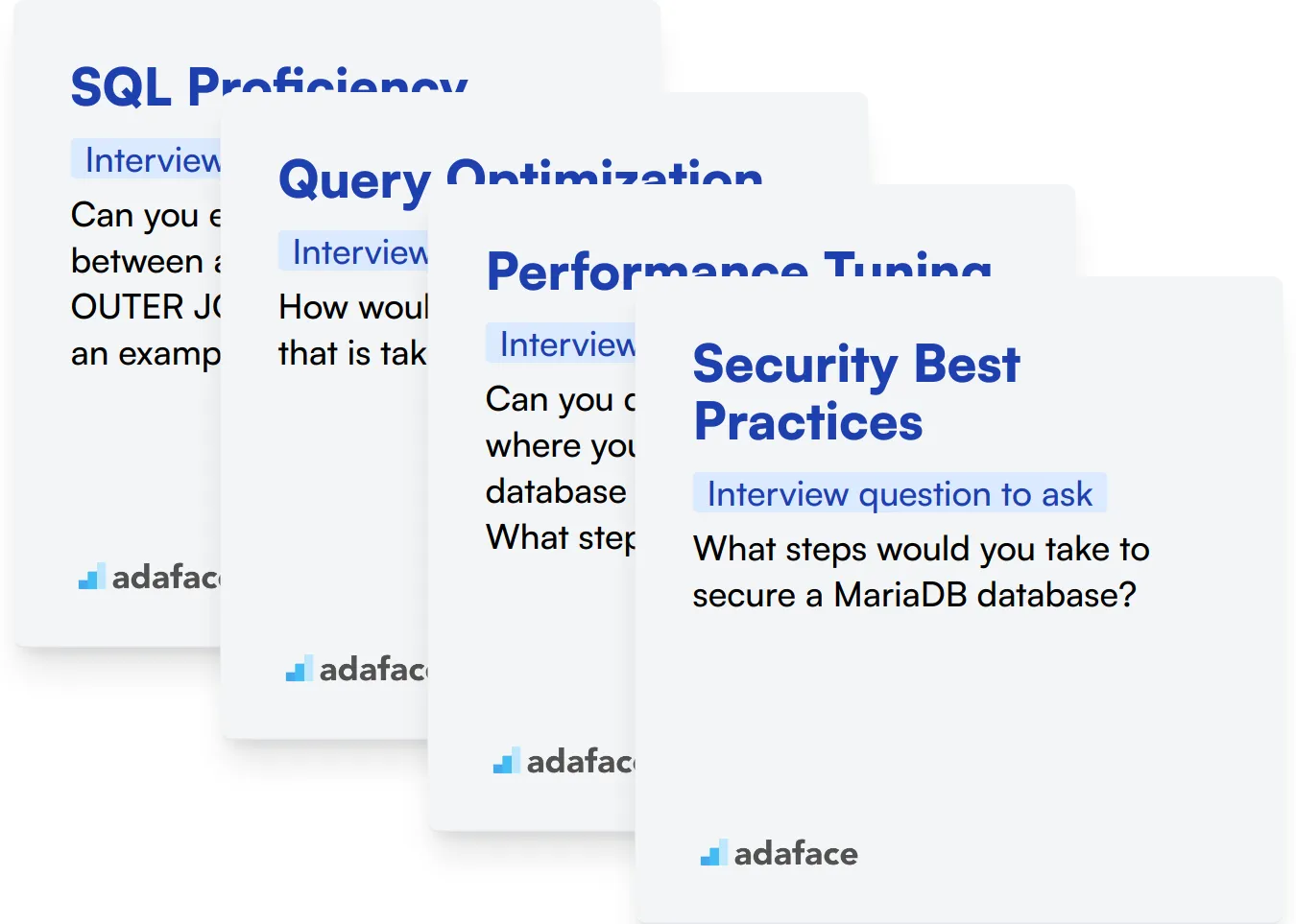
SQL Proficiency
SQL proficiency is fundamental for any database administrator, as it is used to query and manage data stored in MariaDB. A solid understanding of SQL ensures that the candidate can perform tasks such as data retrieval, manipulation, and complex query writing.
Using an SQL Coding assessment test can help filter out candidates who have a strong command of SQL. This test asks relevant MCQs, ensuring that you identify top performers.
In addition to assessment tests, you can ask targeted interview questions to gauge SQL proficiency.
Can you explain the difference between an INNER JOIN and an OUTER JOIN in SQL, and provide an example of each?
Look for candidates who can accurately describe the differences, offer correct syntax, and provide clear examples. This shows their practical understanding of SQL joins.
Query Optimization
Query optimization is critical in ensuring that database operations are performed efficiently. It involves refining SQL queries to improve performance, which is essential for maintaining the speed and responsiveness of a MariaDB database.
Using an SQL assessment test with a focus on query optimization can help you identify candidates who are skilled in writing efficient queries.
Another way to evaluate query optimization skills is by asking specific interview questions that relate to this topic.
How would you optimize a query that is taking too long to execute?
Evaluate the candidate's ability to identify potential issues, such as missing indexes or poorly written queries, and their approach to resolving these problems.
Performance Tuning
Performance tuning in MariaDB involves adjusting database configurations and queries to ensure optimal performance. This skill is important for maintaining a high-performance database environment, especially as the volume of data grows.
Consider using a test related to performance tuning to assess the candidate's ability to maintain and improve database performance.
To further evaluate this skill, ask detailed questions during the interview.
Can you describe a situation where you had to tune a MariaDB database for better performance? What steps did you take?
Look for candidates who can provide specific, actionable steps they took to improve database performance. This indicates their hands-on experience and problem-solving abilities.
Security Best Practices
Ensuring the security of a MariaDB database is essential to protect sensitive data and comply with regulations. This involves implementing best practices such as user authentication, access control, and data encryption.
To assess a candidate's understanding of security best practices, ask targeted questions during the interview.
What steps would you take to secure a MariaDB database?
Ideal candidates will discuss multiple layers of security measures, such as setting up user roles, ensuring encrypted connections, and regularly updating the database software.
3 Tips for Effectively Using Maria DB Interview Questions
Before you start applying what you've learned, consider these tips to enhance your interview process.
1. Leverage Skills Tests Before Interviews
Implementing skills tests before interviews is a great way to gauge a candidate's technical abilities upfront. This helps you filter out candidates who may not meet the technical requirements for the position.
For instance, you can utilize the Maria DB online test to assess core database skills. Additionally, tests related to SQL queries or data modeling can provide a deeper insight into their proficiency.
Using these tests will streamline your interview process, allowing you to focus on candidates who have demonstrated the necessary skills, ultimately leading to more effective interviews.
2. Curate Relevant Interview Questions
Time is of the essence during interviews, so it's important to carefully select a handful of relevant questions. Prioritizing the most significant questions will help you evaluate candidates on key competencies without overwhelming them.
Consider integrating other applicable questions, such as those related to communication skills or teamwork. For example, you might reference interview questions for SQL developers or questions for data modeling.
By focusing your questions, you maximize the evaluation of candidates' relevant skills while also leaving room for follow-up discussions.
3. Ask Insightful Follow-Up Questions
Simply asking interview questions isn’t enough; follow-up questions are essential for gaining deeper insights into a candidate's knowledge and motivations. Such inquiries can reveal if a candidate is truly knowledgeable or just presenting surface-level information.
For example, if a candidate answers a question about optimizing database queries, a good follow-up might be, 'Can you elaborate on how you would handle a specific situation where performance issues arise?' This not only tests their depth of understanding but also shows how they apply their knowledge in real-world scenarios.
Evaluate Maria DB skills using targeted interview questions and assessments
If you're looking to hire someone with Maria DB skills, it's important to ensure they possess the necessary expertise. The best way to achieve this is by utilizing skill tests, such as our Maria DB assessment, which accurately measure a candidate's capabilities.
After conducting the assessment, you'll be able to shortlist the most qualified applicants and invite them for interviews. To streamline your hiring process further, consider signing up on our assessment platform to gain access to a range of tests tailored for your needs.
MySQL Online Test
Download Maria DB interview questions template in multiple formats
Maria DB Interview Questions FAQs
This post covers common, junior, intermediate, advanced, query optimization, and performance tuning MariaDB questions for various experience levels.
The post includes a total of 68 MariaDB interview questions across different categories and experience levels.
Yes, the post provides 3 tips for effectively using MariaDB interview questions during the hiring process.
The post offers guidance on using targeted interview questions and assessments to evaluate candidates' MariaDB skills effectively.

40 min skill tests.
No trick questions.
Accurate shortlisting.
We make it easy for you to find the best candidates in your pipeline with a 40 min skills test.
Try for freeRelated posts
Free resources




